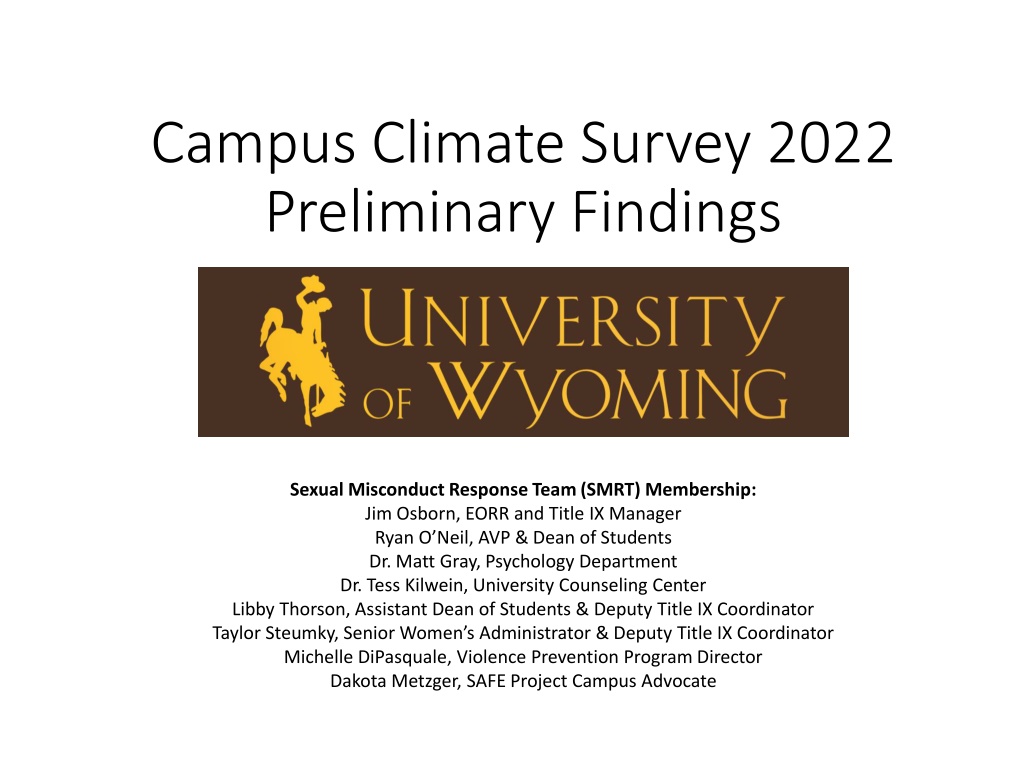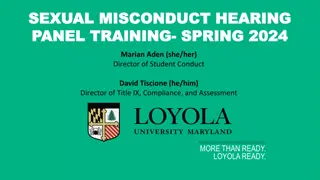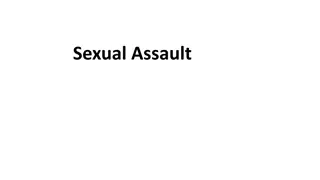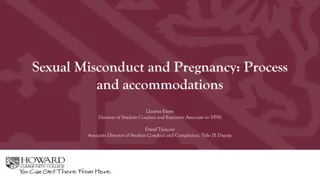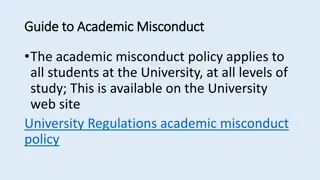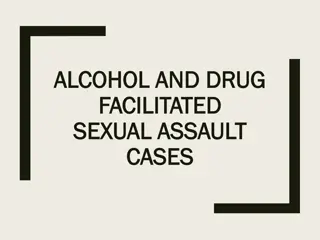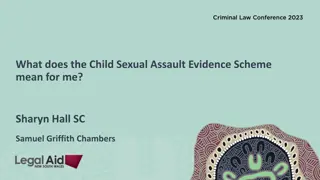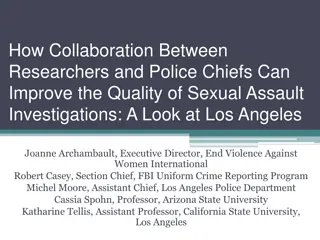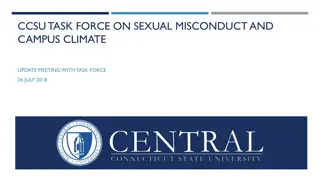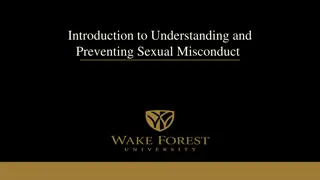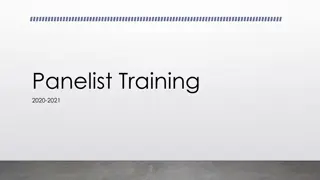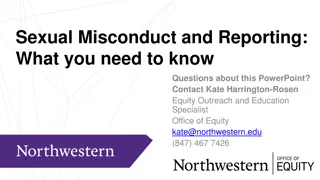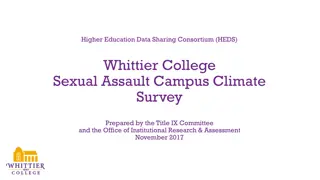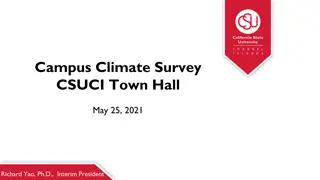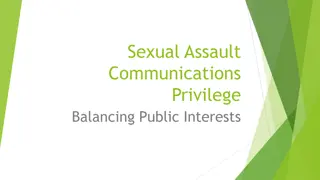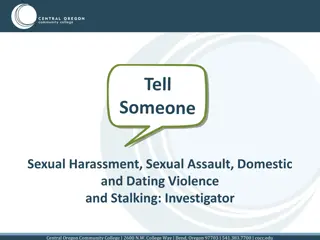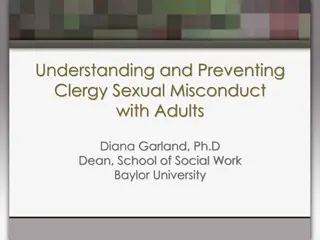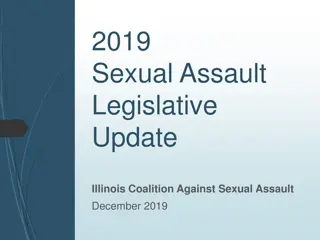Campus Climate Survey 2022 Preliminary Findings on Sexual Misconduct Response Team Membership and Assault Rates at UW
The Campus Climate Survey 2022 Preliminary Findings reveal the members of the Sexual Misconduct Response Team (SMRT) at the university, highlighting the importance of large-scale, methodologically sound surveys in addressing sexual misconduct. The survey indicates significant rates of sexual assault experienced by students, with a focus on unwanted sexual touching, penetration, and rape. The impact of the pandemic and Green Dot program on assault rates among underclassmen is also discussed.
Download Presentation

Please find below an Image/Link to download the presentation.
The content on the website is provided AS IS for your information and personal use only. It may not be sold, licensed, or shared on other websites without obtaining consent from the author. Download presentation by click this link. If you encounter any issues during the download, it is possible that the publisher has removed the file from their server.
E N D
Presentation Transcript
Campus Climate Survey 2022 Preliminary Findings Sexual Misconduct Response Team (SMRT) Membership: Jim Osborn, EORR and Title IX Manager Ryan O Neil, AVP & Dean of Students Dr. Matt Gray, Psychology Department Dr. Tess Kilwein, University Counseling Center Libby Thorson, Assistant Dean of Students & Deputy Title IX Coordinator Taylor Steumky, Senior Women s Administrator & Deputy Title IX Coordinator Michelle DiPasquale, Violence Prevention Program Director Dakota Metzger, SAFE Project Campus Advocate
Rationale and Importance Rationale and Importance Majority of assaults are not reported to campus authorities/officials so large-scale, methodologically sound campus climate surveys are the only viable way to provide accurate information about sexual misconduct. (White House Task Force to Protect Students from Sexual Assault, 2017; US DOJ, 2017; AAUW, 2017) Review of methodologically sound campus climate surveys: 1-in-5 college women experience some type of sexual assault (Muehlenhard, Peterson, Humphreys, Jozkowski, 2017) Consistent with National Intimate Partner and Sexual Violence Survey (NISVS) based on random sample of thousands of individuals nationally Recent reviews disconfirm notion that large-sample, well-conducted campus climate surveys are prone to volunteer bias (see Jeffrey et al., 2022; Muehlenhard et al., 2017)
Sexual Assault Experienced while at UW Sexual Assault Experienced while at UW via Force, Threat of Force, Incapacitation via Force, Threat of Force, Incapacitation N = N = 2223 2223; one of the largest surveys conducted at UW ; one of the largest surveys conducted at UW Overall(2018) Male(2018)Female(2018) TGN(2018) Victim of at least one instance of unwanted sexual touching, penetration, or attempted penetration 18% (21%) 11% (9%) 23% (26%) 12% (38%) Victim of at least one instance of completed or attempted oral, vaginal, or anal rape (excluding nonconsensual touching) 13% (16%) 6% (6%) 18% (21%) 11% (30%) Victim of at least one instance of completed oral, vaginal, or anal rape (excluding nonconsensual sexual touching and attempted, but not completed, rape) 10% (12%) 4% (4%) 14% (16%) 11% (19%) Rates lower across nearly all variants of sexual assault 10 20% reductions overall; 180 fewer severe assaults Not attributable to small N/error: ~2000 participants at both surveys (p s < .01)
Pandemic v Green Dot Pandemic v Green Dot Not primarily attributable to pandemic; arguably primary Green Dot impact: Current freshmen and sophomores represent full campus return Assault rates nationally higher among underclassmen 2018 2022 Underclassmen 21% Underclassmen 15% Victim of at least one instance of unwanted sexual touching, penetration, or attempted penetration Victim of at least one instance of completed or attempted oral, vaginal, or anal rape (excluding nonconsensual touching) Victim of at least one instance of completed oral, vaginal, or anal rape (excluding nonconsensual sexual touching and attempted, but not completed, rape) 14% 11% 11% 7%
Other Variants of Sexual Misconduct Other Variants of Sexual Misconduct 2018 2022 % Reduction Intimate Partner Violence 22% 16% 27% Stalking 31% 23% 26% Sexual Harassment by Other Students* 58% 27% 47% * Most instances of harassment include differential treatment as function of gender or inappropriate sexual jokes/commentary as opposed to sexual pressure/coercion
Green Dot Outcomes Green Dot Outcomes Reported Engaging in Bystander Behaviors while at UW 0 = Never, 1 = Rarely, 2 = Sometimes, 3 = Usually, 4 = Always 3 All comparisons differ significantly (p s < .01) 2 1 Bystander 1 Bystander 2 Bystander 3 Bystander 4 Bystander 5 Bystander 6 Bystander 7 Green Dot No Green Dot Walked a friend who has had too much to drink home from a party, bar, or other social event. 1 1 Talked to a drunk person s friends to make sure they don't leave them behind at a party, bar, or social event. 2 2 Spoke up against sexist jokes. 3 3 Tried to distract someone who was trying to take a drunk person to another room or trying to get them to do something sexual. 4 4 Ask someone who looks very upset at a party if they are okay or need help. 5 5 Intervene with a friend who was being physically abusive to another person. 6 6 Intervene with a friend who was being verbally abusive to another person. 7 7
Green Dot Outcomes (Cont.) Green Dot Outcomes (Cont.) Endorsed lower rape myth acceptance (p < .10) Associated with: Lower victim blaming Greater bystander intervention intent and behavior Better support for peers disclosing assault Report greater (p s < .05, d s .4 - .6) Knowledge of how/where to report sexual misconduct Understanding of how sexual misconduct claims are handled Knowledge of where to go on campus to get support for sexual misconduct
Supports Provided in 2018 and Current Status: Encouraging Outcomes, Precarious Future No More GA to treat 10 sexual assault survivors per week - Funding provided by BOT in 2019 and currently supported - thank you! - Looking to secure funds for an additional GA to support 20 30 additional survivors per year UCC Trauma Psychologist - Currently vacant, recent search failed, salary is a barrier - Trauma-Specific treatments less available Green Dot Training at UW 40 faculty/staff - Less than half remain Prevention Specialist - Currently doing phenomenal job on prevention education! - Need to add staffing to focus on response and resources for those impacted by interpersonal violence. In SUM tremendous, unprecedented strides in past 4 years. Data attest to impact and represent rare good news on this front. Continued support for data affirmed progress necessary for continued improvements in sexual violence prevention and response.
